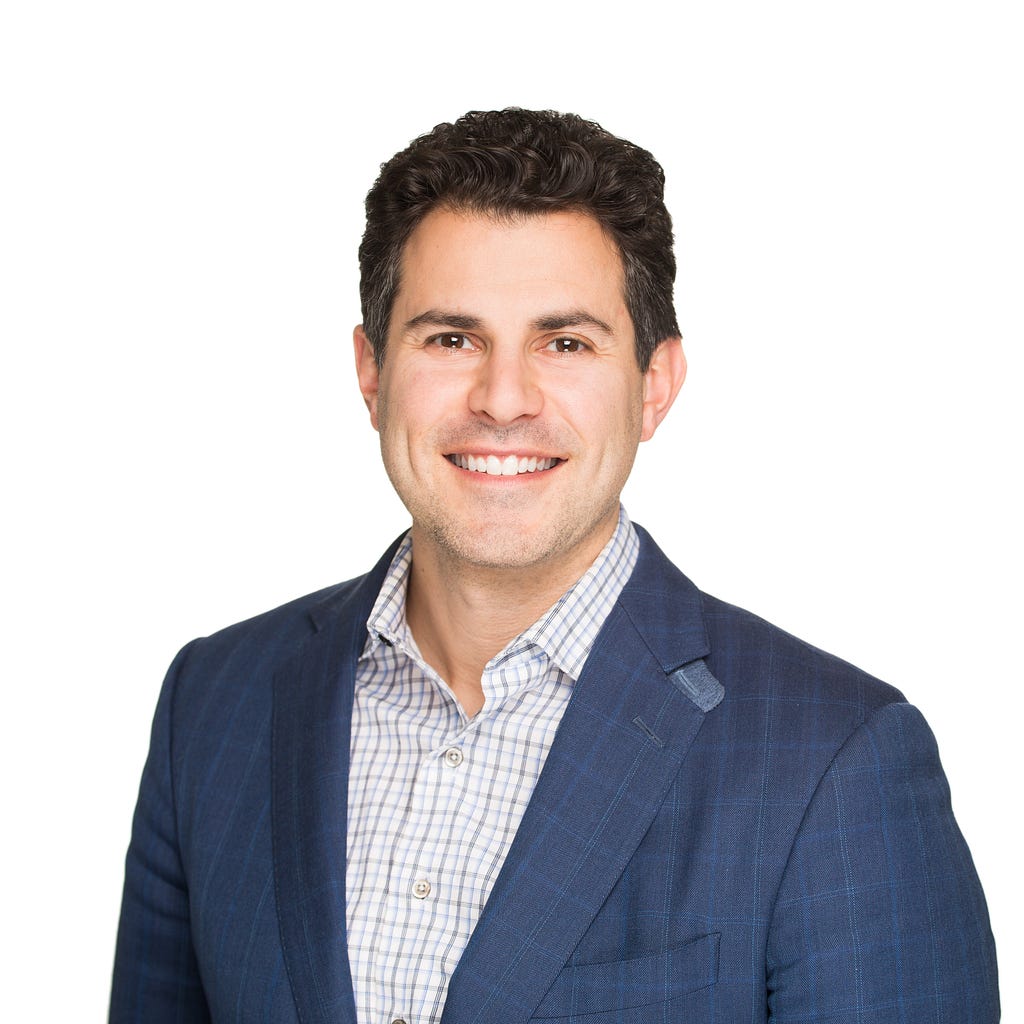
Be transparent and human — Too many leaders think they can talk past a critical issue. Employees respond much better when you treat them with candor, and I’m committed to being overly transparent with them. They always know what you are NOT saying. For example, if the business is going to miss its numbers, show them the financials and then tell them what we are going to do to change the trend.
As part of our series about the “Five Things You Need To Be A Highly Effective Leader During Turbulent Times”, we had the pleasure of interviewing Jared Kaplan, CEO at Cadre.
Jared Kaplan is the Chief Executive Officer at Cadre — a groundbreaking, technology-driven commercial real estate investment platform that offers both institutional and individual investors the opportunity to invest in real estate assets with lower minimums, low fees, and unprecedented potential for liquidity. Via its data-driven and transparent approach, Cadre opens participation in a historically opaque and illiquid asset class. In this role, Jared leads day-to-day management and strategic growth initiatives. He is an entrepreneurial executive with extensive operating experience leading fintech firms.
Thank you so much for your time! I know that you are a very busy person. Our readers would love to get to know you. Can you tell us a bit about your ‘backstory’ and how you got started?
I grew up as an identical twin with two amazing parents in a suburb of Detroit, Michigan. Both of my parents instilled a strong work ethic in me at an early age — they were both hard workers in their own right — and as a result of being a twin, a competitive nature is in my blood.
I went to the University of Michigan for Business Administration and my professional career began at Goldman Sachs. I gained valuable, real-world experience on top of great training and learning opportunities to grow as a leader, allowing me to move into the private equity space. I soon realized that I could use the skills I had developed to disrupt more established industries. I co-founded Insureon, a startup that allowed small businesses to navigate insurance more easily, and served as the CEO of OppFi, which facilitates safe, simple and more affordable credit access.
In June, I became Cadre’s CEO. Cadre is a breakthrough fintech platform aiming to democratize commercial real estate investing opportunities. Cadre’s success has been fueled by its proprietary approach, leveraging its high-tech capabilities and high-touch insights to deliver return for its investors across specific projects, diversified funds and more. Cadre has a tremendous opportunity, given the volatility in the stock market, to help investors diversify their portfolios amidst a potential recession, given commercial real estate’s success during previous recessionary periods.
It has been said that our mistakes can be our greatest teachers. Can you share a story about the funniest mistake you made when you were first starting? Can you tell us what lesson you learned from that?
It didn’t take long for me to realize that there’s always a need to take a step back before giving feedback because in today’s business world, you can’t expect people to be mind readers. For example, one of my previous companies was in the midst of a high-growth phase and I was still hearing employees talk about the company with dated stats and information. I had materially changed our elevator pitch but realized this hadn’t been properly communicated to the broader team. We made a purposeful effort to take a step back and deliver consistent, timely internal communications and saw payoff immediately.
None of us are able to achieve success without some help along the way. Is there a particular person who you are grateful towards who helped get you to where you are? Can you share a story?
My parents were always prime examples of leadership and grace — they made sure that both my brother and I knew the sky was the limit in terms of our potential, and instilled a strong work ethic. My father worked in the medical field, and my mom worked in consulting.
Some of the most impactful leadership lessons throughout my career have actually come from negative examples. I learned very quickly that nothing productive comes from motivating employees through negativity of any kind. I’ve also witnessed other examples — leaders trying to do too many things at once, too many conflicting priorities, etc. — that while not harmful, inspired me to behave in an opposite manner as a leader.
Extensive research suggests that “purpose-driven businesses” are more successful in many areas. When your organization started, what was its vision, what was its purpose?
Cadre seeks to simplify commercial real estate via its revolutionary, tech-forward platform. Cadre’s founder Ryan Williams was someone I admired long before I joined the organization. Together, we’re deliveringCadre’s original mission of delivering new and innovative ways to use technology to power investing in communities around the country. We also continue to build Cadre as a force to democratize investing, which will be extremely important in the months ahead as folks navigate a potential recession. Cadre’s data-forward approach, combined with the past success of commercial real estate in recessionary periods, gives us confidence that we continue to deliver.
Thank you for all that. Let’s now turn to the main focus of our discussion. Can you share with our readers a story from your own experience about how you lead your team during uncertain or difficult times?
When you’re leading a company in a difficult time — esp. when you’re a start-up or working in a fast-paced environment — you have to be prepared for uncertainty and the missteps that come when you are moving quickly in difficult times. I like to say, you need to fix what is broken and learn from it quickly. In these moments, being calm, cool, collected and compassionate are the best attributes to help you see clearly through the uncertainty and make informed decisions that can alter the course of an issue or provide steady navigation when the road is rocky.
Did you ever consider giving up? Where did you get the motivation to continue through your challenges? What sustains your drive?
I point once again to family — and having parents who were such great role models growing up. My brother has a very successful career in private equity and our competitively healthy relationship has led us both to maximize our potential.. Together, we have built a support system where we know we can always turn to each other for advice.
I’m an author and I believe that books have the power to change lives. Do you have a book in your life that impacted you and inspired you to be an effective leader? Can you share a story?
Delivering Happiness by Tony Hseih. Value creation for customers above their next best alternative is the core tenant of any healthy business. We care deeply what customers think and sometimes one complaint can provide insight into a major business issue. I once read a customer review that talked about our pricing in a way I didn’t think was correct. The team looked into it and, to my surprise, this customer had in fact highlighted a mistake. We immediately fixed the issue that would have lingered if I had not read the negative review. I have found it particularly impactful to talk to customers about their whole experience, not just their successes. They typically appreciate hearing from the CEO and are often willing to share critical details about what we can do better.
What would you say is the most critical role of a leader during challenging times?
Be visible, transparent and calm. One of the most interesting facets of our business at Cadre is that sometimes challenging times can also be doors to open up opportunity. Looking holistically across the business world, the pandemic’s onset brought what felt like insurmountable challenges across many industries but in short order, tremendous opportunities began to present themselves as things started to re-open.
Looking ahead, the leaders of Cadre know it’s important to trend-spot and stay true to our data-driven approach to investment, which will help identify those areas of opportunity ahead of market turbulence. For both investors in the platform as well as internally within Cadre’s organization, we know communication and transparency will be two key factors as we continue to grow.
When the future seems so uncertain, what can a leader do to inspire, motivate and engage their team?
Honesty and authenticity should guide leaders’ behavior during uncertain times. It is important to recognize that employees, customers and stakeholders alike will look to c-suite leaders in times of crisis or unknown outcomes, and communication guided by transparency will give them full confidence that you are paying close attention to their concerns.
What is the best way to communicate difficult news to one’s team and customers?
It is best not to sugarcoat difficult news — communicate it swiftly and honestly — and always balance that with hope.
How can a leader make plans when the future is so unpredictable?
The pandemic taught me the importance of planning for the unknown. It is also important to stay grounded in your original mission and purpose, regardless of the circumstances. At Cadre, it is using technology and our data-driven approach to navigate our investments during a volatile climate. It is also empowering our people to put us in the best position possible to service our investors.
Can you share 3 or 4 of the most common mistakes you have seen other businesses make during difficult times? What should one keep in mind to avoid that?
1. Create chaos by doing too many things at once — a simple, well focused plan has a much better chance at succeeding.
2. Setting unattainable goals — stretch goals are an imperative part of growing a successful business, but unrealistic goals can be demotivating. We must motivate employees to their highest abilities; however, pushing someone to hit a goal that has no probability of success is a huge way to lose top talent.
3. Letting a negativity fester — High stress environments can throw interpersonal workplace relationships into dysfunction. Build a company culture that is inclusive and focused on outcomes, and when a distraction or office politics interfere, be direct and solutions-oriented in every facet of communication. Planning time to take the company or business unit out of the office is also a great way to build better interpersonal relationships in the workplace.
4. They stop having fun — The best companies have employees that enjoy being together, but high stress can quickly hinder performance and enthusiasm. Create a culture where employees are excited about work. During tough times, a supportive and fun company culture can be a rallying cry to set the team up to win. Yes, some periods of growth are hard, but how great will it be when we figure this out and are on the other side of it?

Here is the primary question of our discussion. Based on your experience and success, what are the five most important things a business leader should do to lead effectively during uncertain and turbulent times? Please share a story or an example for each.
1. Be transparent and human — Too many leaders think they can talk past a critical issue. Employees respond much better when you treat them with candor, and I’m committed to being overly transparent with them. They always know what you are NOT saying. For example, if the business is going to miss its numbers, show them the financials and then tell them what we are going to do to change the trend.
2. Highlight examples of customer satisfaction — Widely share every five-star testimonial received from customers. Employees will appreciate seeing their hard work recognized, and that both their personal goals and the overall mission of the company is being achieved.
3. Communicate more often than you think is necessary — Lack of information makes employees nervous. Stay in frequent communication so they clearly understand events, good and bad, in real-time.
4. Develop a top talent retention playbook — Losing your best performers will put anyone on edge, and can have immediate adverse effects. Make sure you have a game plan to continue to reward and inspire individual top performers, including clear goals that can be accomplished autonomously, while also giving them a safe space to make mistakes–no employee is perfect.
5. Reinforce your company’s identity — During volatile times, lean into your company’s purpose and mission harder than ever. At Cadre it’s finding a way to win for our investors using our proprietary, data-driven approach to real estate investing. Regardless of the industry, reinforcing your key differentiator and pushing your team to think about how a breakthrough idea can ladder back up to this will help employees stay grounded and serve as a reminder of why they joined your company in the first place.
Can you please give us your favorite “Life Lesson Quote”?
“Success is not a Straight Line.” Some of my biggest setbacks have led to my highest peaks. Although it can be difficult in the moment, failure can allow us to course correct and refocus our ambition to something that can bring us more success than we originally imagined. Sometimes you have to move one step back to move two steps forward.
How can our readers further follow your work?
For more information, head to Cadre.com.
Thank you so much for sharing these important insights. We wish you continued success and good health!
Jared Kaplan of Cadre: 5 Things You Need To Be A Highly Effective Leader During Turbulent Times was originally published in Authority Magazine on Medium, where people are continuing the conversation by highlighting and responding to this story.
